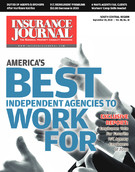The Louisiana Supreme Court Weighs In
Following Hurricane Katrina, many insurance agents and brokers were sued by customers who found they were underinsured for their losses caused by the hurricane. It is fair to say that most of those claims involved issues concerning the amount of, or the lack of, flood insurance coverage, but there were also claims involving the existence or adequacy of other types of coverage, such as business interruption. As such, most of the allegations against the insurance agents and brokers were claims of omission, i.e., the agents and brokers failed to advise their customers to purchase certain types of insurance that would have provided coverage for their Katrina caused damages and/or failed to advise their customers of the availability of such coverages.
Prior to Katrina, Louisiana courts, including the Louisiana Supreme Court, had certainly issued decisions discussing the extent of the duties owed by insurance agents and brokers to their customers. However, given the extent of the damage caused by Hurricane Katrina, the number of suits filed against insurance agents and brokers, the different forums in which they were filed and the natural sympathy toward the victims of the hurricane, the nature of the duty imposed on insurance agents and brokers became somewhat blurred in the different factual situations presented in the lawsuits.
Now, the Louisiana Supreme Court has weighed in and addressed the responsibilities, post-Katrina, of insurance agents and brokers to their customers in the case of Isodore Newman School v. J. Everett Eaves Inc. On the surface, the Newman decision appears to do nothing more than reaffirm existing Louisiana law; however, it could be read as effectively holding that insurance agents and brokers are not subject to the same duties typically imposed on other professionals, such as doctors, engineers and lawyers.
Pre-Katrina Decisions
Although there is a distinction between insurance agents and insurance brokers, Louisiana courts have held that both insurance agents and brokers owe the same duty to customers for whom they have agreed to procure insurance. In general, insurance agents and brokers are responsible for their fault or neglect and, as professionals, they are charged with knowing the different types of insurance policies available and the terms, conditions and parameters of those policies. If they do not understand the terms of a policy being sold, then they are responsible for learning what is included and what is excluded under the policy.
More specifically, in Karam v. St. Paul Fire and Marine Ins. Co., 281 So. 2d 728 (La. 1973), the Louisiana Supreme Court stated:
“An insurance agent who undertakes to procure insurance for another owes an obligation to his client to use reasonable diligence in attempting to place the insurance requested and to notify the client promptly if he has failed to obtain the requested insurance. The client may recover from the agent the loss he sustains as a result of the agent’s failure to procure the desired coverage if the actions of the agent warranted an assumption by the client that he was properly insured in the amount of the desired coverage.”
Louisiana courts subsequently recited in their decisions that to establish the liability of an insurance agent, a customer had to prove that the agent (1) agreed to procure insurance for the customer, (2) failed to use reasonable diligence in obtaining the insurance or failed to notify the customer promptly of the failure to obtain the insurance and (3) led the customer to assume that he or she was properly insured.
The Isodore Newman School Decision
Isodore Newman is a private high school located in New Orleans. As a result of physical damage to the school from Hurricane Katrina, it was closed for several months and lost tuition income in excess of $3 million. It subsequently discovered that under its insurance policy, lost tuition was covered as part of the business interruption and extra expense coverage (BI&EE) and that coverage was limited to $350,000. Newman sued its insurance broker alleging that the broker failed to advise it that lost tuition was included in the BI coverage, led it to believe that the BI coverage was limited to physical damage to buildings, failed to evaluate its coverage needs and failed to advise it of different available coverages.
The Louisiana Supreme Court framed the issue as “whether the insurance broker or agent owed a duty to a client to provide recommendations on the scope and amount of property and casualty insurance coverage that the school should procure, and whether the insurance broker or agent, in this instance, owed a duty to explain the components of the existing policy, which clearly informed Newman that the business income and extra expense coverage was designed to encompass the loss of tuition revenue.”
Citing the opinions of various prior Louisiana decisions, including its own opinion in Karam, the Louisiana Supreme Court assessed Louisiana law on the duty of insurance agents and brokers as follows:
- An insurance agent owes a duty of “reasonable diligence” to his customer, which is fulfilled when the agent procures the insurance requested.
- There is no authority for the proposition that an insurance agent has a duty to recommend that a client increase its insurance coverage.
- An insurance agent has no duty to inquire into a client’s financial condition and make recommendations about higher coverages; the agent’s only duty is to obtain the coverage requested.
- Absent a specific question from the customer, an agent has no duty to advise the customer that it is underinsured.
- An agent has no duty to independently assess the customer’s insurance needs and the customer is responsible for communicating its insurance needs and has the primary responsibility of reading its policy upon receipt.
- The “advice” an insurance agent has an affirmative duty to give to customers is with respect to those aspects of the policy not generally within the knowledge of a layperson.
Based on the foregoing, the Louisiana Supreme Court held that Newman’s insurance broker did not breach any duty to Newman. In reaching this conclusion, the Court noted that “Newman is not alleging that it was misled into believing it had coverage that it did not, nor that Newman was told that [its]desired coverage was unavailable. Newman, in fact, refused additional coverage at an increased cost. Simply put, Newman never requested coverage for BI&EE in an amount that would cover its tuition losses.”
The Newman Decision and Future Courts
On the surface, the Newman decision appears to do nothing more than apply well-established “bright line” Louisiana law regarding the duties owed by insurance agents and brokers. However, prior to Newman, several Louisiana courts had held that agents and brokers were more than “mere order takers.” Newman would suggest that “absent specific questions” by the customer, the insurance agent is essentially an “order taker,” required only to ensure that the order is filled properly. As a result, most future claims brought against insurance agents and brokers by their customers would appear to be limited to those situations in which “specific questions” are asked and then will require an evaluation of the nature of the questions asked and the reasonableness of the response.
Insurance agents and brokers, however, should be aware that Newman does not necessarily prevent them from incurring a duty to their customers that they would not otherwise owe. If an agent voluntarily inquires about the customer’s circumstances and makes coverage recommendations based on those circumstances, the agent incurs a duty to use reasonable care in doing so. Another possible fertile ground for claims left open by Newman is the determination of which aspects of insurance policies are not generally within the knowledge of a layperson and about which an insurance agent or broker must advise the customer.
Nonetheless, Newman overall clarifies and removes much of the uncertainty about the duties of insurance agents and brokers to their customers that was potentially created by Katrina related litigation.
Was this article valuable?
Here are more articles you may enjoy.


 Georgia Insurance Law Is About to Get an Upgrade With Multiple Changes
Georgia Insurance Law Is About to Get an Upgrade With Multiple Changes  Ford Recalling 4.3 Million US Vehicles Over Software Issue
Ford Recalling 4.3 Million US Vehicles Over Software Issue  Florida Appeals Court Pulls the Plug on Physician Dispensing in Workers’ Comp
Florida Appeals Court Pulls the Plug on Physician Dispensing in Workers’ Comp  State Farm Inked $1.5B Underwriting Profit for 2025 but HO Loss Persists
State Farm Inked $1.5B Underwriting Profit for 2025 but HO Loss Persists 


